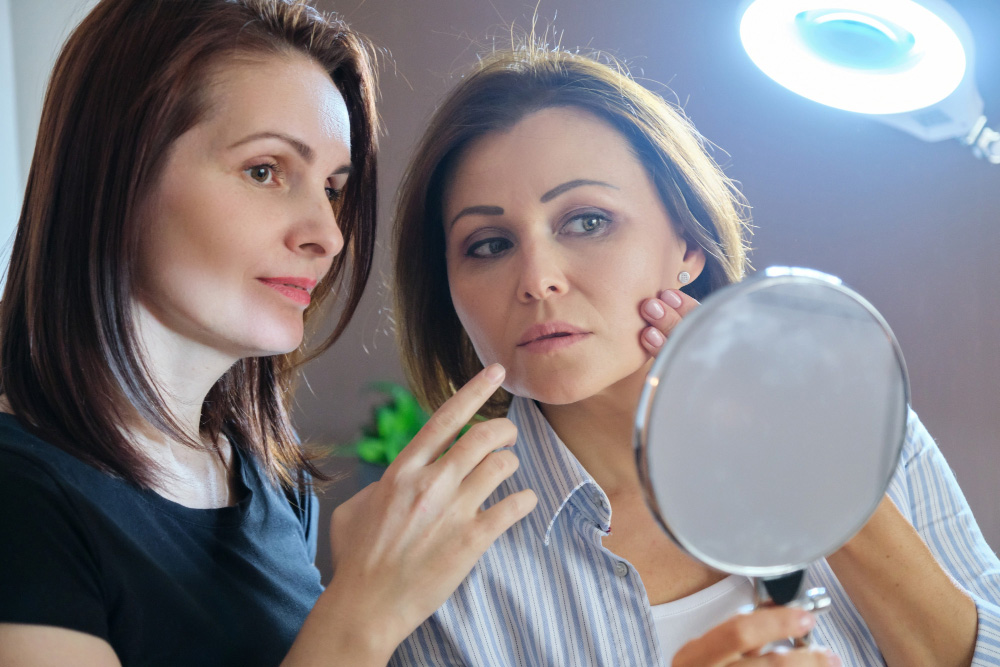Dealing with Hyperpigmentation: How to Fade Dark Spots and Achieve Even-Toned Skin February 5, 2025

Hyperpigmentation, a common skin concern, manifests as dark spots or patches caused by an excess production of melanin. While it’s not harmful, hyperpigmentation can affect self-esteem and confidence. For individuals in regions like Dubai, the United Arab Emirates (UAE), and Lebanon, where sun exposure and environmental factors play a significant role, understanding how to treat and prevent hyperpigmentation is crucial for achieving even-toned, radiant skin. This guide will walk you through the causes, treatments, and preventive measures for managing hyperpigmentation effectively.
Understanding Hyperpigmentation: Causes and Types
Hyperpigmentation occurs when the skin produces more melanin, the pigment that gives skin its color. Common causes include:
- Sun Exposure: Prolonged exposure to UV rays triggers melanin production, resulting in sunspots.
- Hormonal Changes: Conditions like melasma, often linked to pregnancy or birth control, cause dark patches.
- Post-Inflammatory Hyperpigmentation (PIH): Dark spots that appear after acne, injury, or skin inflammation.
- Age: Age spots or liver spots occur due to prolonged sun exposure over the years.
Step-by-Step Guide to Fading Dark Spots
Addressing hyperpigmentation requires patience and consistency. Here’s how to fade dark spots and achieve a more even complexion:
1. Use Sunscreen Daily
Sun protection is the cornerstone of treating and preventing hyperpigmentation. UV rays can worsen existing dark spots and create new ones.
- Tip: Use a broad-spectrum sunscreen with at least SPF 30. Reapply every two hours, especially if you’re in sunny areas like Dubai, the UAE, or Lebanon.
2. Incorporate Vitamin C into Your Routine
Vitamin C is a powerful antioxidant that brightens the skin and reduces the appearance of dark spots by inhibiting melanin production.
- How to Use: Apply a vitamin C serum in the morning after cleansing and before moisturizing.
3. Exfoliate Regularly
Exfoliation removes dead skin cells, allowing new, healthy skin to surface and lightening dark spots over time.
- Types of Exfoliation: Use chemical exfoliants like AHAs (glycolic acid) or BHAs (salicylic acid) for best results.
- Frequency: Limit exfoliation to 2-3 times a week to avoid irritation.
4. Try Retinoids
Retinoids stimulate cell turnover, helping to fade dark spots and improve skin texture.
- Tip: Start with a low concentration and gradually increase usage. Always apply sunscreen during the day as retinoids can increase sun sensitivity.
5. Consider Professional Treatments
If over-the-counter products don’t provide the desired results, professional treatments can be effective:
- Chemical Peels: Removes the outer layer of skin to reveal brighter, even-toned skin.
- Laser Therapy: Targets and breaks down pigmentation with precision.
- Microdermabrasion: Gently exfoliates the skin to reduce the appearance of dark spots.
6. Use Niacinamide
Niacinamide, a form of Vitamin B3, helps lighten dark spots and strengthen the skin barrier.
- How to Use: Apply niacinamide as a serum or within your moisturizer, both morning and night.
Preventing Hyperpigmentation
Preventing dark spots is just as important as treating them. Here are some preventive measures to incorporate into your routine:
- Wear Sunscreen: Apply sunscreen every day, even on cloudy days or while indoors near windows.
- Avoid Picking at Your Skin: Picking acne or blemishes can lead to post-inflammatory hyperpigmentation.
- Use Gentle Products: Avoid harsh scrubs or products that irritate your skin.
- Stay Consistent: Maintain a skincare routine tailored to your skin type and concerns.
Hyperpigmentation in Dubai, UAE, and Lebanon
In regions like Dubai, the United Arab Emirates (UAE), and Lebanon, environmental factors such as intense sun exposure and pollution can exacerbate hyperpigmentation. Protecting your skin with sunscreen, hats, and sunglasses is essential. Additionally, using hydrating and antioxidant-rich skincare products can combat the effects of environmental stressors, ensuring healthier skin over time.
When to See a Dermatologist
If your hyperpigmentation is persistent or worsening despite over-the-counter treatments, it’s time to consult a dermatologist. They can assess your skin and recommend targeted treatments for your specific concerns.
Conclusion
Dealing with hyperpigmentation requires a consistent skincare routine, patience, and the right skincare products. Whether you’re in Dubai, the United Arab Emirates (UAE), or Lebanon, protecting your skin from sun exposure and incorporating treatments like vitamin C, retinoids, and professional services can help fade dark spots and achieve even-toned skin. By understanding the causes and implementing preventive measures, you can enjoy a radiant, blemish-free complexion that boosts your confidence every day.
Safety Disclaimer:
The information in this article is for educational purposes only and is not a substitute for professional medical advice. Always consult a dermatologist before starting new treatments, especially if you have sensitive skin or existing skin conditions.
